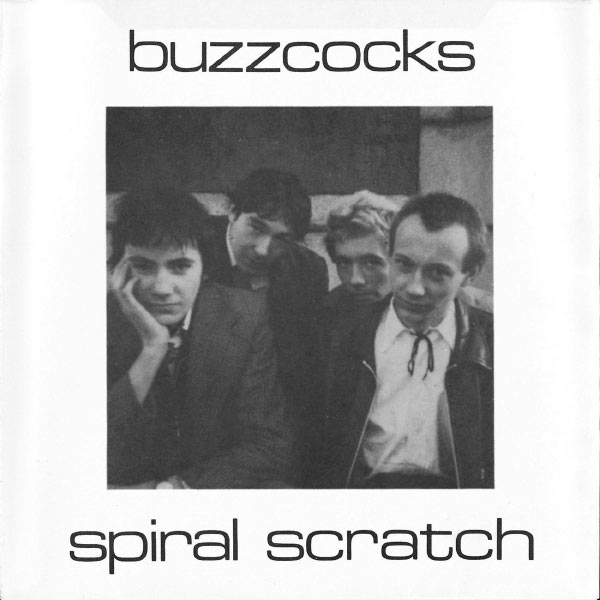On 27 January will be celebrating the 40th anniversary of the release of Buzzcocks’ legendary ‘Spiral Scratch’ EP by reissuing it.
Then on 10 March they’ll be releasing Time’s Up, the 1976 demos recorded with founding member Howard Devoto and originally released as a bootleg, alongside the Buzzcocks (mk.1) Box, which will contain both vinyl and CD of both Spiral Scratch and Times Up alongside rare reprinted ephemera of the time.
Howard Devoto lifted Buzzcocks name from a January 1976 Time Out review of ‘Rock Follies’, the 1970s TV musical drama following the ups and downs of the fictional female rock group, ‘Little Ladies’.
Appropriating it as the name for his new band that he had recently formed with Pete Shelley, Buzzcocks witnessed firsthand the white-heat of the early Sex Pistols. Howard and Pete organised the now infamous 1976 Lesser Free Trade Hall gigs that brought punk to the provinces and galvanized the new Manchester music revolution. The plan was to simply play support to the Pistols and then see what happened next…
Featuring the original line-up of Howard Devoto (vocals & songwriter), Pete Shelley (guitar & songwriter), Steve Diggle (bass guitar) and John Maher (drums), the material which made Time’s Up was recorded at Revolution Studios, Bramhall Lane Stockport on the 18th of October 1976. The session, recording Buzzcocks’ live set at the time, cost £45 and was engineered by Andy MacPherson.
In December of the same year, the band recorded the Spiral Scratch EP with a minimum of fuss in ‘downtime’ at Indigo Studios, with Martin Hannett (then going under the pseudonym of Martin Zero) producing. The band took it upon themselves to release the EP themselves, somehow finding the monies necessary to press up 1000 copied on 7” vinyl, on their own New Hormones label. The EP sold for £1 a copy. Within days of the initial release, with typical punk chaos and sweet disregard for any cohesive business strategy, Howard Devoto revealed that he was quitting the band. The Spiral Scratch EP quickly sold out its initial 1000 pressing, went on to sell 16,000 copies over the next six months and is now recognised as one of, if not the, most important records of the punk explosion – the first self-released record of its time, with the band responsible for everything, from sleeve design to distribution.
Spiral Scratch remains a testament to the power of punk’s possibilities and is an object lesson in how to debunk and demystify any hurdles presented by the establishment. The impact of this incredible seven inches of vinyl that kick-started the whole D.I.Y. culture goes on, and on, and on, and on, and on…















No Comment